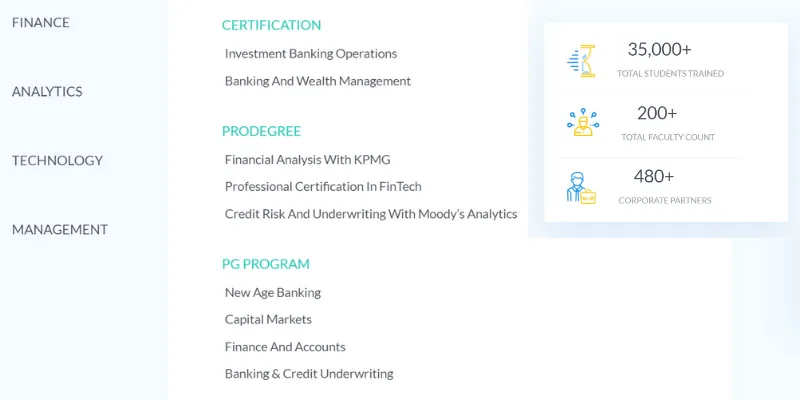This woman entrepreneur is bridging the gap between formal education and industry needs
Edtech startup Imarticus Learning provides industry relevant skilling courses in finance, technology, and analytics, priced between Rs 70,000 and Rs 1.7 lakh.
Mumbai-based edtech startup is gaining popularity with an annual average growth rate of 40 percent. The startup’s industry specific skilling solutions in the areas of finance, technology, analytics, and management have also entered into partnership with over 480 companies.
However, co-founders Sonya Hooja (37) and Nikhil Barshikar (41) had a humble beginning from Andheri, Mumbai in 2012 when the country was not this gung-ho about online learning. The duo had to work hard to market their product and business model to answer the important question,“Why should a fresh graduate pay an additional Rs 1 lakh after his graduation?”
The brother-sister duo has always been keen on creating large-scale impact in the skill training economy.
Learning meets industry needs
Prior to starting up in 2012, Sonya was working in Accenture Singapore in strategy development and had also consulted with the government of Brunei for nearly seven months on its tourism and education policy. She also conducted workshops for the Prime Minister’s Office in Singapore on problem-solving and project management skills and various public sector executives on ways to develop business models and monetisation strategies for SmallGrid in Singapore.
An MBA graduate from INSEAD, France, Sonya has a bachelor’s degree in Economics and Information Technology from Rutgers University in the US and has been closely associated with the financial services world throughout her career.
When she returned to India in 2012 for personal reasons, she decided to start up in the development space along with her brother. She recalls one common complaint across corporates in financial services - they were spending too much time on training fresh graduates and wanted skilled and talented workforce.
Their first course to address this need, Certified Investment Banking Operations Professionals (CIBOP) was introduced – and it continues to be the startup’s flagship programme till date.
“We took fresh graduates, trained them in very specific skill sets and then took complete responsibility for their placements,” Sonya says, adding that the initial success led to further product expansion into areas of finance, analytics, and technology over the years. Additional programmes on marketing and management were introduced earlier this year.
Major corporate companies including KPMG, IBM, Deutsche Bank, Citibank started showing interest in partnering with Imarticus Learning in co-creating courses and placement opportunities. Priced between Rs 70,000 and Rs Rs 1.7 lakh per course, the platform has a placement record of 65 to 85 percent led by its 15-member placement team.
“We don't try to teach them the entire gamut of the domain but upskill them on specific skill set and go into significant depth so that there is value for both learners as well as the corporates,” Sonya shares.
This also led the startup move from a B2C focussed platform to catering to B2B clients for corporate employee training as well. The B2B channel contributes to 20 to 30 percent of the business, according to the founders.

(Image credit: Imarticus Learning)
Designing courses for the future
The startup began by designing courses internally with the help of a strong management team with an average corporate experience of 15 to 20 years of experience. Sonya emphasises, “We were clear that we didn’t want academicians because practical corporate knowledge is the missing flavour in our educational system.”
Today, with over 200 subject matter experts on board, course formulation starts with researching on skill gaps in the industry, followed by product designing with well-defined outline and in-depth dive into the curriculum.
“We want to make it as practical as possible by referring to case studies from corporate partners because we don’t want to sit in our bubble and be solving problems that are not realistic,” she adds.
The courses are broadly categorised into pro-degree courses of 200 hours for three to four months while postgraduate programmes of nearly 600 hours last for six to seven months. While the former is targeted at those with little knowledge of the subject, postgraduate courses start from the basics.
Headquartered in Mumbai, the startup has learning centres that are like “mini-campuses of four classrooms with a counsellor's room and labs in 15 cities including Bengaluru, Chennai, Hyderabad, Delhi, Gurugram, Pune, and Ahmedabad.
Market and growth post COVID-19
After COVID-19 broke out in India, the learning centres were completely shut down while online engagement took off significantly, registering a growth of 400 to 500 percent.
However, Sonya expects an annual growth of around 25 percent for the current financial year , a dip from 40 percent in the last eight years since inception. “Q1 numbers are stagnant but we are seeing significant growth rate in Q2,” she shares.
Having scaled successfully, the startup is now focused on bringing the right talent on board to ensure our promise is delivered to customers.
Their initial marketing efforts included visiting colleges to conduct workshops, webinars, and organising guest lectures. It claims to be a ‘digital-first organisation’ with its marketing strategies a mix of branding and regeneration through digital channels.
Bootstrapped with an initial round of investment of Rs 5 crore from friends and family, the startup raised $ 2 million as part of its Series A round from CBA capital in 2018. This was spent on developing a products portfolio and expanding reach in the domestic market.
Profitable since inception, it’s now looking for strategic investors who can contribute to the startup’s vision and growth.
Sonya says that the one definite lesson they have learned from the pandemic is to be more focussed on online learning. The next few years will be centred on product development. After a successful pilot of expanding to the UAE last year, the startup aspires to tap the international market in the years to come.
Edited by Rekha Balakrishnan









